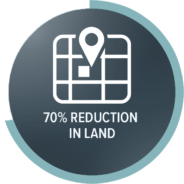Innovator Spotlight: Edenworks
Brooklyn, New York
Brooklyn, New York



With nearly 95 percent of leafy greens consumed in the United States being grown in parts of Arizona and California, producing a fresh and flavorful product is Edenworks’ top priority. They operate in a closed-loop aquaponics system, where fish and plants work together to produce a high-quality product.
At first, Edenworks constructed a southern facing greenhouse with a terraced rack. However, rapid changes in LED technology led them to adopt a vertical stack design, deploying LED technology to replace sunlight. Edenworks conducted a trial of several LED vendors, ultimately installing the latest technology from Fluence, the Fluence RAZR3 system. “Due to the high real estate costs in Brooklyn, we need to be creative with our space and the Fluence RAZR3 allows us to add more layers of production per-square-foot while increasing light uniformity across the canopy,” said Silverman.
Edenworks is also able to reduce installation costs with the RAZR3 daisy-chain configuration which cuts down on installation time, material cost and labor. The system’s high energy-efficiency also cuts down on the consumption and cost of electricity. “The thin design of the Fluence RAZR3 allowed us to easily mount the fixtures into our custom vertical racks without taking up precious cultivation space, and the daisy chain configuration made for a quick, low-cost and no hassle install,” said Silverman.
Edenworks is attempting to change the perception of the microgreen from a high-end garnish to a flavorful salad anyone can enjoy and easily pick up at the local Whole Foods Market situated less than two miles away from the farm. They harvest in seven to ten days, from seed to microgreen, package directly in their facility and deliver directly to the store within 24 hours of harvest. Crops grown include radish, kale, mustard, cabbage, and broccoli microgreens. Cultivating a unique product at an affordable price has generated a great response from consumers.
Edenworks plans to expand in 2018 to a larger facility to meet the demand of grocers throughout New York and the Northeast. “We plan to sell baby greens after the expansion, and this was one of the real differentiators for the Fluence RAZR fixture. Because we can grow crops as close as eight inches from the Fluence lights, we can add more layers of production, effectively increasing our overall yield from our facility,” said Silverman.

Aquaponics is a recirculating agriculture technique. Fish are raised for protein, and their waste is converted by a microbiome of bacteria into nutrients for the plants. The plants filter the water, creating a symbiotic relationship. Currently operating two tanks of tilapia, a continuous flow of water travels through a drop filter to separate larger solids, then proceeds into a moving bed bioreactor to convert ammonia produced by the fish into nitrogen plants can absorb. Finally, water moves into a water tower to regulate the amount of nutrients entering the vertical growing system.
“With aquaponics, it is important to note that you are actually working with three types of living organisms; fish, plants, and bacteria. This naturally occurring bacteria is crucial not only to convert ammonia to nitrate, but also to help maintain pH levels, help the plants to absorb nutrients, and contribute to plants’ immune system against pests and disease, so you end up having a more robust ecosystem that is responsible for flavor in the greens.”
Research, trials, and continued support from Fluence have allowed Edenworks to achieve their goals across the board, lowering their utility bill, reducing the amount of real estate needed, and providing fresh greens on Brooklyn’s market shelves and dinner tables.
